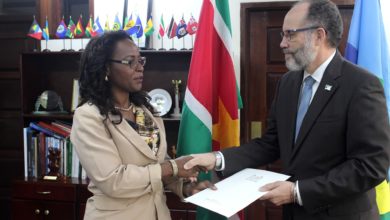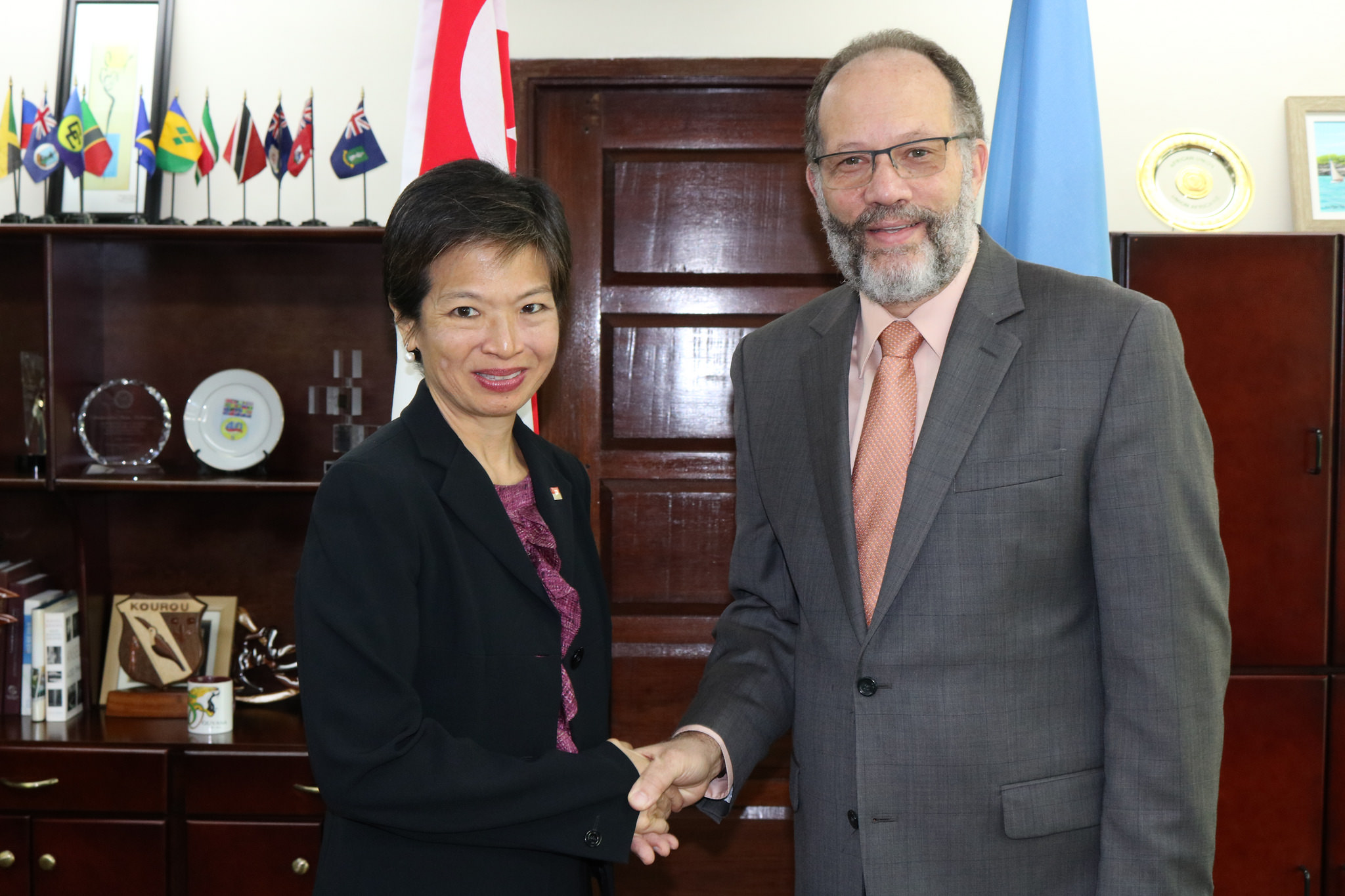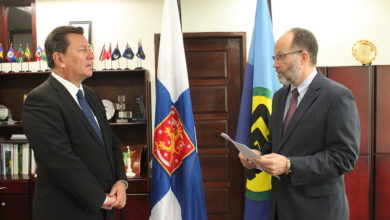(CARICOM Secretariat, Turkeyen, Greater Georgetown, Guyana) Good Morning. Mr. Secretary-General, my first and most enjoyable task today is to extend to you the warmest congratulations on your assumption of the office of Secretary-General of the Caribbean Community. We have worked together for many years and I know that in you, the Community is in very capable and committed hands. I wish you a most successful term of office. Also, as I said to you in my congratulatory note on the occasion of the Decision of the Heads of Government, my services are at your disposal as and when you indicate you need them.
Allow me also to say a stupendous thanks to the Deputy Secretary-General for the wonderful and professional way in which she stepped into the breach as we awaited the definitive Decision of the Heads of Government on the choice of the Secretary-General. Your contribution Deputy Secretary-General could not have been more timely and worthy. Thank you once again.
Mr. Secretary-General, a truer statement there has not been than that of William Shakespeare that “All the world’s a stage and all the men and women merely players. They have their exits and their entrances, And one man in his time plays many parts…”
Today I have the great honour of playing what for me is a historic third part in regard to this Organization, as I present to you Mr. Secretary-General my credentials from my Government – The Government of Trinidad and Tobago – seeking to be accredited as its Ambassador Extraordinary and Plenipotentiary to the Caribbean Community.
Secretary-General, I need not tell you that this is for me a historic occasion, one which I can assure you ranks alongside the highest of all my life’s professional experiences. It is set to become my third relationship with the Secretariat of the Caribbean Community. My first, from 1970-1976, saw me occupy the position of Chief of Economics and Statistics and subsequently of Director of Trade and Integration.
My second, as virtually all of you would be aware, was as Secretary-General from 1992-2010, a period in which I had the great pleasure and satisfaction of working with most of you present here today, in leading the institution for virtually what was half of the life of the integration process.
Mr. Secretary-General, in recalling the experience of that second relationship, I cannot fail to express once again my thanks for the tremendous support I received from virtually all of you, as well as the respect, friendship and regard with which the country of Guyana embraced me.
My third relationship, that on which I hope to embark today, is one in which I am looking forward to yet another opportunity to contribute to the development of our Caribbean Community, this time from the outside, as it were, of the Secretariat.
It is an opportunity for which I am extremely pleased and one through which my Government hopes to enhance its contribution to the development of the Caribbean Community to which it is firmly committed. I wish to recall here the words of my Prime Minister in her statement to the 32nd Meeting of the Conference of Heads of Government of the Community in July of this year, when she said: “Let me at the onset categorically indicate that Trinidad and Tobago is for CARICOM and for regional integration. Let me also indicate that Trinidad and Tobago understands its role in CARICOM and its responsibility to the region and is committed to cooperation.”
Mr. Secretary-General, I need not recite all the many achievements of the Community to date. Permit me however to mention, for example, that we are undoubtedly the oldest integration grouping among developing countries. We have also established a number of institutions and agencies to deliver on the fundamental commitment of our integration process, namely, to enhance the quality of life of our peoples. In that regard, we have established, among others: a unique Caribbean Court of Justice (CCJ), to give legal direction and certainty to our integration processes; a Climate Change Centre (CCCCC) to spearhead our efforts in combating this global challenge, especially to small, low-lying island developing countries; a Single Market and a Competition Commission (CCC) to ensure equity within that single economic space; a Development Fund (CDF), to respond to the special needs of the less developed members of our Community; and through the Caribbean Festival of Arts (CARIFESTA) brought our cultures and thereby our peoples together.
Also, only recently, the entire United Nations, which had earlier conferred the status of International Best Practice on our Pan Caribbean Partnership Against HIV/AIDS (PANCAP), stood in support and appreciation of CARICOM’s determined and successful effort to place on the global agenda the problem of Non-Communicable Diseases (NCDs).
CARICOM has therefore made significant progress in a number of areas critical to the improvement in the quality of life of its citizens – the numbers of which have more than doubled with the accession of Haiti and Suriname to the Community.
Equally, Mr. Secretary-General, you are certainly aware that the challenges facing the Community have also significantly increased. First of all, the global environment, economic and otherwise, has become more difficult and less supportive of our ambitions; some of our key trading arrangements have in significant measure deteriorated; and our overall indebtedness has increased. Internally, our own significant “implementation deficit” does not help our cause. The efforts needed to respond to and to overcome these challenges have, therefore, increased considerably.
It is the recognition of this overall difficult situation, Mr. Secretary-General, that has driven me and some others to recommit to and to redouble our efforts to see in what way we can contribute to this struggle. For there is, in our view, no more effective way in which we can help to build a Caribbean Community worthy of our future and of that of our children, and I dare say our grandchildren as well. And, as you know Mr. Secretary-General – and I believe we share the following perspective – I have always firmly believed that the involvement and participation of our Youth in the integration process is of paramount importance to its future success.
Mr. Secretary-General, you would have heard me frequently affirm that integration is not for the faint of heart. If one were to have any doubts about the veracity of this statement, one only needs to look at the struggle in which the world’s most advanced integration grouping – the European Union – is currently involved. Indeed, the German Chancellor called it Europe’s worst hour since the Second World War. It is however showing resolve. We too need so to do in relation to the challenges facing all four pillars of our integration process.
Permit me a brief reference to this issue. We have identified Human and Social Development, Foreign Policy Co-ordination, Economic Integration and Security Cooperation as the four main pillars of our integration process. There has undoubtedly been progress in each of these pillars, but this progress has been uneven. I cannot help but feel in that regard that too much importance has been placed what I choose to call the ‘economics of things’ as against the ‘humanity of things’.
Consequently, as the economic progress has become more difficult and less rapid and substantial, the perception of the progress of CARICOM has become increasingly negative. Moreover, the stomach for the entire struggle seems to have weakened.
This situation must also be seen in the context of the current changing global economic and political environment. It is clear, for example, that economic and with it, political power and influence is shifting from the West to the East. Within this process of global change the Arab Spring has brought about hitherto unimagined changes in the Middle East; and the European Union’s battles over the indebtedness of some of its Member States and the implications for the Euro has shaken the global economic structure.
Within our own Community, change has been at virtually all levels including the Heads of Government, the Ministerial and the Institutional. In a word, change has been the hallmark of these times, and I believe will continue to be. Sadly, much of that process of change has included significant disasters at home as much as abroad. I cannot but reflect on the vehicular accident in Saint Lucia in which 19 persons were said to have perished. In this time of change it would be most unfortunate if we allow that important pillar of our integration process – the coordination of Foreign Policy – to be shaken.
Mr. Secretary-General, you have heard me refer many times to the struggle the Secretary-General faces and as you lead the struggle to reaffirm, fortify and advance our integration process, I ponder over whether our Public Education in all its facets does not call for significant enhancement if we are to succeed. My hopes have been lifted by the quantity and quality of the information that I have recently seen emanating from the Secretariat. My concern however, is to what extent is such information available to the Community’s public including the Universities and secondary schools for currently, very little of it seems to find its way into the national dailies, perhaps except here in Guyana.
Mr. Secretary-General, it is with these and other concerns, perspectives and hopes gleaned from the ‘outside’ as it were that I hope on behalf of my Government to help in the uphill task of strengthening the Community, much of which falls so heavily on you and your staff of the restructured Secretariat.
Mr. Secretary-General, as you will recall Trinidad and Tobago is a Founding Member of this Community. Despite many changes, it remains committed to its continued growth and development. My accreditation to the Community is a deliberate step towards that end. I therefore pledge to you and your staff all the support of which I am capable, in the name of the Government and people of Trinidad and Tobago on whose behalf and in whose name I seek your acceptance of my letter of Credence, and I thank you for already having done so.





